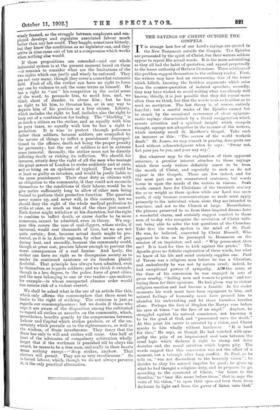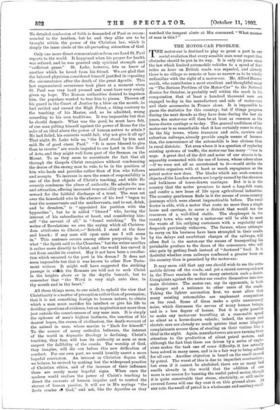THE SAYINGS OF CHRIST OUTSIDE THE GOSPELS.
IT is strange how few of our Lord's sayings are quoted in the New Testament outside the Gospels. TLe Epistles are permeated by the spirit of Christ, but their writers seldom appear to repeat His actual words. It is the more astonishing as they all had the habit of quotation, and appeal perpetually to the lesser authority of Hebrew literature. Three solutions of this problem suggest themselves to the ordinary reader. First, the writers may have had an overweening fear of the letter which killeth, knowing the fruitless arguments which arise from the counter-quotation of isolated speeches ; secondly, they may have wished to avoid writing what was already well known; thirdly, it is just possible that they did repeat more often than we think, but that the words were so familiar as to need no ascription. The last theory is, of course, entirely fanciful ; but a careful reader of the Epistles cannot but be struck by the occasional occurrence of short epigram- matic sayings characterised by a literal exaggeration which arrests attention and a spiritual insight which compels thought, sayings not altogether in the manner of the writers, which instantly recall St. Matthew's Gospel. Take such an instance as this : "The sorrow of the world worketh death." St. James, we may remark in passing, does quote our Lord without acknowledgment when lie says : "Swear not. Let your yea be yea, and your nay nay."
But whatever may be the explanation of their apparent reticence, a peculiar interest attaches to those sayings which these early writers definitely assert to be from the mouth of Christ, and especially to such as do not appear in the Gospels. These are few indeed, and for the most part are not remembered sentences, but words borne in upon the minds of the writers in visions. Such words cannot have for Christians of the twentieth century the sa-ne weight as those spoken while our Lord was upon earth, if only because communications so made must apply primarily to the individual whom alone they are intended to convince, and not to the Church at large. Nevertheless, the phrases preserved to us from these inspired dreams have a wonderful charm, and certainly suggest comfort to those men of to-day who recognise the revelation of Christ with- out being able to solve the test questions of the Churches. Take first the words spoken in the mind of St. Paul. He was, he believed, converted by Christ Himself, Who appeared to him as he journeyed to Damascus on the mission of an inquisitor, and said : "Why persecutest thou me ? It is hard for thee to kick against the pricks." The Apostle gives no definite explanation of these words, but whet we know of his life and mind certainly supplies one. Paul of Tarsus was a religious man before he was a Christian, and undoubtedly he was not by nature cruel; indeed, he had exceptional powers of sympathy. Alle the same, at the time of his conversion he was engaged in acts of gross cruelty, "hailing men and women to prison" and tor- turing them for their opinions. He had given way to violent religious emotion and had become a fanatic. In his cooler moments his work must have been repugnant to him, and natural feelings of humanity must have pressed him to abandon his undertaking and let these harmless heretics alone. Perhaps the face of Stephen the Martyr rose before his eyes at times "as the face of an angel." Anyhow, he struggled against his natural conscience, not knowing it to be the goad of God, and "persecuted unto the death." At this point his career is arrested by a vision, and Christ speaks to him wholly without harshness. "It is hard for thee," He says, as though He had watched with sym- pathy the pain of an impassioned soul torn between the cruel logic which declares it right to stamp out false doctrine and the moral intuition which begets pity. The words suggest that this conversion was not the affair of a moment, but a triumph after long conflict. St. Paul, as he tells us, "was not disobedient to the heavenly vision "; be decides to obey his natural impulse for good ; he gives up what be had thought a religious duty, and he prepares to go, according to the command of Christ, "far hence to the Gentiles," to "bear His name before them," that is, says the voice of his vision, "to open their eyes and turn them from darkness to light and from the power of Satan unto God."
No detailed confession of faith is demanded of Paul or recom- mended to the heathen, but he and they alike are to be brought within the power of the Christian law, which is simply the inner circle of the all-pervading attraction of God.
Only one more direct communication from our Lord St. Paul reports to the world. It happened when his prayer for health was refused, and he was granted only spiritual strength and "sufficient grace." St. Luke, however, lets us know of another which he heard from his friend. We are glad that the beloved physician considered himself justified in repeating the circumstance after the death of the great Apostle. This last supernatural occurrence took place at a moment when St. Paul was very hard pressed and must have very nearly given up hope. The Roman authorities desired to imprison him, the populace wanted to tear him to pieces. Thrown off his guard in the Court of Justice by a blow on the mouth, he had reviled and cursed the High Priest, a thing contrary to the teaching of his Master, and, as be admitted, wrong according to his own traditions. It was impossible but that
he should despair. What was the good, he must have felt,
of one man pitting himself against the power of Rome for the sake of an ideal above the power of human nature to attain ?
He had failed, his converts would fail; why not give it all up?
That night, St. Luke tells us, "the Lord stood by him and said, Be of good cheer, Paul." "It is more blessed to give than to receive" are words imputed to oar Lord in the Book of Acts, and they might well form part of the Sermon on the Mount. To us they seem to accentuate the fact that all through the Gospels Christ recognises without condemning the desire of the strong man to rule, to be in the position of him who leads and provides rather than of him who follows and accepts. To increase in men the sense of responsibility is one of the first objects of Christ's teaching, and while He severely condemns the abuse of authority, He admits its use and attraction, offering increased responsioility and power as a reward for the faithful discharge of a trust. The man set over the household who in the absence of his lord "began to beat the menservants and the maidservants, and to eat, drink, and be drunken," is "appointed his position with the hypocrites "; but he is called " blessed " who, having the interest of his subordinates at heart, and considering him- self "the servant of all," is "found watching." To the writer of Revelations we owe the saying which all Christen- dom attributes to Christ,—" Behold, I stand at the door and knock ; if any man will open unto me I will come in." This sentence occurs among others purporting to be what "the Spirit said to the Churches," but the writer ascribes it rather more directly to Christ, and the world has carved it out from amidst its context. May it not have been a recollec- tion which recurred to the poet in his dream It does not seem impossible but that it was known 'to other New Testa- ment writers. It might well have suggested the striking passage in wlilch the Romans are told not to seek Christ in the heights above or in the depths beneath, but to remember that "the Word is very nigh unto thee, in thy mouth and in thy heart."
All these things seem, to our mind, to uphold the view that Christianity is a matter of perception rather than of persuasion; that it is not something foreign to human nature, to obtain Which a man must sacrifice his intellect or give his life to deciding questions of evidence, but an inspiration not more than just outside the consciousness of any sane man. It is simply the epitome of man's highest instincts, the sanction of his dearest hopes, the crown of civilisation, the death-warrant of the animal in man, whose maxim is "Each for himself." To the sorrow of many orthodox believers, the interest of the world in dogmatic theology is declining. Christ's teaching, they fear, will lose its authority as soon as men suspect the fallibility of the creeds. The worship of God, they imagine, will die out before this new deification of conduct. For our own part, we would humbly assert a more hopeful conviction. An interest in Christian dogma will, we believe, be revived by nothing but the widespread practice of Christian ethics, and of the increase of their influence there are surely many hopeful signs. When once the modern world realises the power of Christ's teaching to direct the currents of human impulse and to control the storms of human passion, it will see in His sayings "the lively oracles di God," and ask, like the Apostles as they watched the tempest abate at His command, "What manlier of man is this ? "











































 Previous page
Previous page